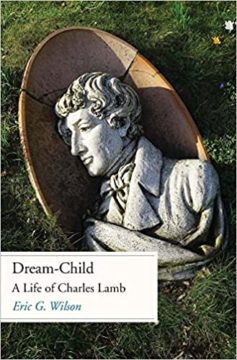Edward Weech at Literary Review:
 Despite being among the most entertaining and accessible of Romantic authors, Charles Lamb (1775–1834) has been out of fashion for many years. After his death, generations of Victorians and Edwardians continued to be charmed by his essays, letters and children’s books. But he exerted less lasting influence than more philosophical peers, such as Samuel Taylor Coleridge and William Wordsworth, and in the interwar period, changing tastes and Leavisite critical hostility contributed to Lamb being dropped from the popular Romantic canon. Lamb has always attracted admirers (notably in the ranks of the Charles Lamb Society) and numerous books on aspects of his life and work have been published. Yet, as Eric G Wilson observes, Dream-Child is the first full-scale biography in over a century.
Despite being among the most entertaining and accessible of Romantic authors, Charles Lamb (1775–1834) has been out of fashion for many years. After his death, generations of Victorians and Edwardians continued to be charmed by his essays, letters and children’s books. But he exerted less lasting influence than more philosophical peers, such as Samuel Taylor Coleridge and William Wordsworth, and in the interwar period, changing tastes and Leavisite critical hostility contributed to Lamb being dropped from the popular Romantic canon. Lamb has always attracted admirers (notably in the ranks of the Charles Lamb Society) and numerous books on aspects of his life and work have been published. Yet, as Eric G Wilson observes, Dream-Child is the first full-scale biography in over a century.
Covering the gamut of Lamb’s life and literary career, Wilson aims to demonstrate that Lamb ‘speaks to our age’, highlighting his enthusiasm for ‘the grit and speed and diversity of the urban’ and his ‘fluid, collaborative vision of identity’.
more here.
